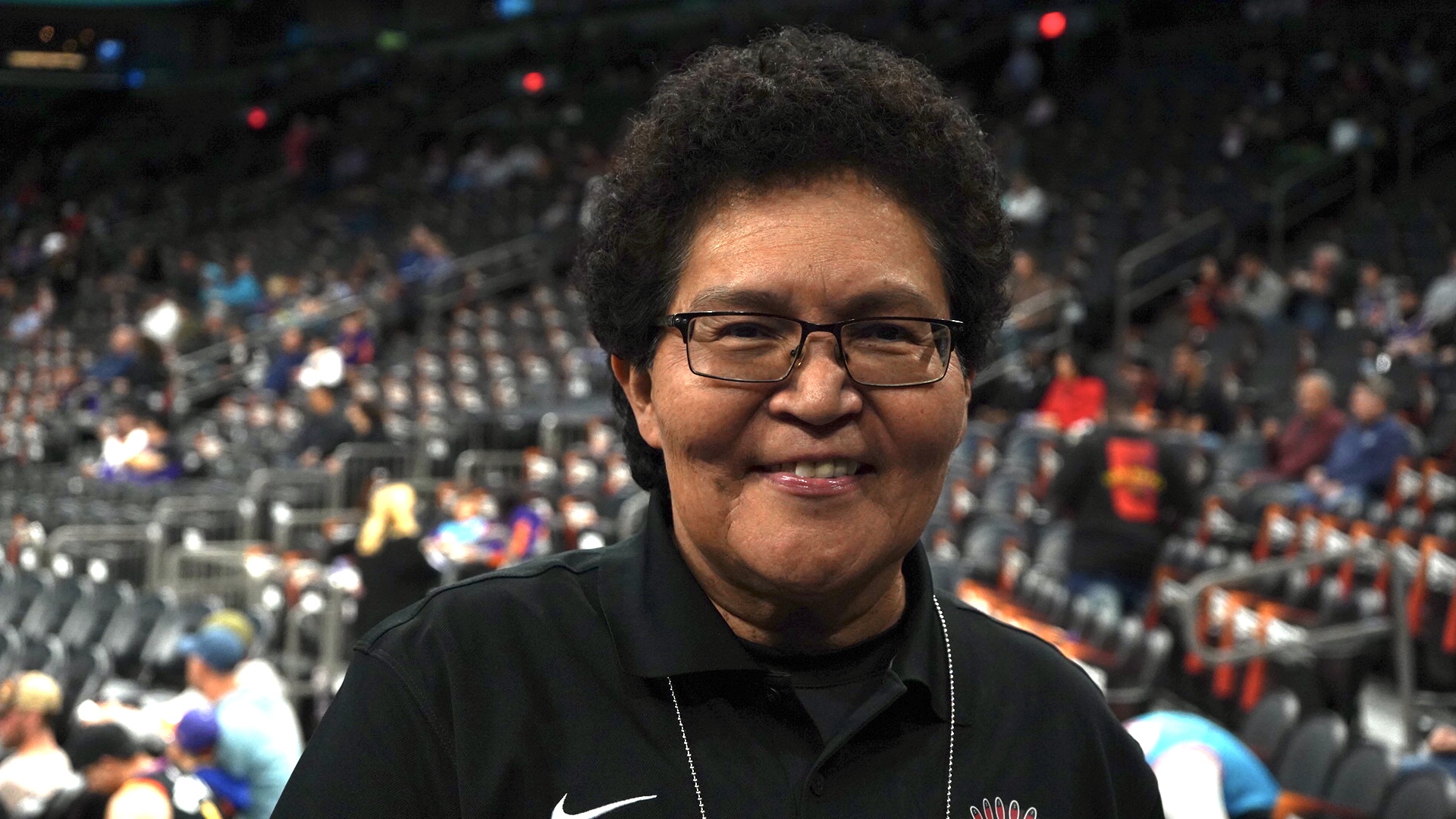
- Details
- By Darren Thompson
PHOENIX —As the Phoenix Suns began its postseason run in the NBA playoffs, the Navajo language has, too.
Navajo sportscaster L.A. Williams will broadcast the Phoenix Suns playoff stint in Diné Bizaad — the language of the Navajo people — KTNN 101.5 FM. The Suns are ranked 3rd in the NBA Playoffs in the Western Division and are tied as they enter their third game in a best-of-five-game matchup against the Los Angeles Clippers tonight on the Clippers' home court.
Williams, 57, has been sports commenting in Diné Bizaad since 1993. This year marks her second consecutive season broadcasting a Suns playoff run.
“Being asked to carry the game in the Navajo language is a tremendous job, but what it takes is to be a sports person,” Williams said in an interview with Native News Online. “You have to like sports to commentate and put yourself in the shoes of the athletes and where they are coming from.”
Williams began sportscasting when the Phoenix Suns had a successful playoff run that matched them against the Michael Jordan-led Chicago Bulls in the 1992-1993 NBA Finals. Longtime Suns broadcaster Al McCoy approached Williams during the 1993 Arizona high school state playoffs and asked if KTNN — the radio station of Navajo Nation —could broadcast the game in Diné Bizaad.
“He was one who’s introduced us and welcomed us to broadcast in the Navajo language during the 1993 championship run,” she said
After the 1993 championship stint, KTNN followed and commented on the Suns for three seasons.
Last year, Williams was invited back by the Suns senior director of Live Presentation, Shawn Martinez, also a Navajo Nation citizen from Window Rock.
Williams is also the director of KXWR, a sportscasting program at Diné College, where she teaches the next generation of native speakers to carry on the craft of sportscasting in their language. She notes that the language is highly descriptive and nuanced, adding the complexities of live commentary.
“There are five different ways to describe ‘foul’ in the Navajo language, depending on their excitement and actions,” Williams said. “The Navajo language is a very descriptive language. Teaching how to use the language in a public speaking format is a new thing — there’s a way to it.”
The key is to put some humor into it,” she said of her craft. “I put myself in the positions of the players, of how the coaches walk on the sidelines, or how the audience is responding.”
Williams says that the Navajo language is in higher demand than ever.
“We’re being told we’re losing our language,” Williams said. “We’re not. We’re still here on this earth and we’re not going anywhere. We still have our Navajo language.”
More Stories Like This
Watermark Art Center to Host “Minwaajimowinan — Good Stories” ExhibitionMuseums Alaska Awards More Than $200,000 to 12 Cultural Organizations Statewide
Zuni Youth Enrichment Project Takes Top Emerging Artist Apprentices to Phoenix for Artistic Exploration and Cultural Immersion
From Dishwasher to Award-Winning Chef: Laguna Pueblo's Josh Aragon Serves Up Albuquerque's Best Green Chile Stew
Rob Reiner's Final Work as Producer Appears to Address MMIP Crisis
Help us defend tribal sovereignty.
At Native News Online, our mission is rooted in telling the stories that strengthen sovereignty and uplift Indigenous voices — not just at year’s end, but every single day.
Because of your generosity last year, we were able to keep our reporters on the ground in tribal communities, at national gatherings and in the halls of Congress — covering the issues that matter most to Indian Country: sovereignty, culture, education, health and economic opportunity.
That support sustained us through a tough year in 2025. Now, as we look to the year ahead, we need your help right now to ensure warrior journalism remains strong — reporting that defends tribal sovereignty, amplifies Native truth, and holds power accountable.
 The stakes couldn't be higher. Your support keeps Native voices heard, Native stories told and Native sovereignty defended.
The stakes couldn't be higher. Your support keeps Native voices heard, Native stories told and Native sovereignty defended.
Stand with Warrior Journalism today.
Levi Rickert (Potawatomi), Editor & Publisher

